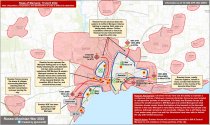Lethe
Captain
Soon it may be time to write a novel (set in Ukraine 2022) that's like a revision of _Four Feathers_.
Speaking of Ukrainian novels, John Dolan of Radio War Nerd has recommended Bulgakov's 'The White Guard' for its insights relevant to the current conflict in Ukraine. In a subscriber newsletter, he goes into the contemporary politics of Ukrainian writers. Here are some excerpts from the newsletter:
A century ago, a 17-year old named Nikolka Turbin wrote on the tiles of a stove in Kiev, “If people tell you the Allies are coming to help us out of this mess, don’t believe them. The allies are swine.”
His sister Elena seconds the emotion: “And where are our gallant Allies all this time? Ugh, the swine. Promises, promises…”
Nikolka and Elena are characters in Mikhail Bulgakov’s 'The White Guard' (Belaya Gvardiya) which we’ve talked about several times on RWN. The novel describes the Turbins’ doomed struggle to survive in Kiev in 1918-19, when the city changed hands again and again.
If there’s a lesson from The White Guard that fits today, it’s what Nikolka wrote on the stove: Don’t trust “the Allies,” whatever they call themselves. Ukraine will be left on its own — with their sympathy but not much else.
If there’s another lesson in the novel, it’s Bulgakov’s feel for divided loyalties, of people pulled apart by conflicting identities
[....]
The White Guard begins, “Great and terrible was the year of Our Lord 1918, hardly the second since the Revolution.” And its final chapter begins, “Great was the year and terrible, the year of Our Lord 1918, but the year 1919 was even more terrible.”
In other words, it goes from bad to worse. You can see why “Russian novel,” for Anglo novelists like Wodehouse, came to mean “incredibly depressing stuff.” Bulgakov warns you there won’t be any happy ending early on:
“Their life had been darkened at its very dawning. Cold winds had been blowing without cease from the north [i.e. Moscow]…and their lot would be to suffer and die.”
The novel describes the descent, from bad to even worse, experienced by the Turbins. The older brother Alexei has come home from the Tsar’s defeated army; his sister Elena is waiting for her husband, Sergei Talberg, who’s serving with the Hetman’s Ukrainian forces; Nikolka, the youngest, is trying to figure out his place in the fast-dissolving world of Kiev 1918.
It wasn’t an easy task, figuring out what was going to happen next in Kiev. It never has been, go back as far as you want in history. The city sits in the middle of a very fertile flat plain which made for good grazing every time mounted invaders felt like looking for greener pastures. Mountains could stop or delay those steppe riders, but Ukraine has none. The sea could stop them, as Japan and Java discovered, but Ukraine has only rivers, and steppe cavalry loved rivers.
[....]
Ukrainian nationalists don’t usually like The White Guard, or any of Bulgakov’s work. Bulgakov is usually classified as a Russian rather than Ukrainian writer, and doesn’t make the current politicized lists of Ukrainian authors.
This raises the question of what a Ukrainian writer is. If it’s someone who wrote in Ukrainian rather than Russian (or German or Yiddish), then Bulgakov is definitely Russian, not Ukrainian. And in the current rhetorical climate, Russian is not just a different category from Ukrainian but its antithesis. Just today a Ukrainian government organization tweeted a statement that while Ukrainians are Slavs, pure and simple, Russians are ethnically impure, a mix of Slavic and Asiatic “Ugro-Finnish tribes.”
The problem with defining writers by their chosen language is that you always end up disqualifying somebody you want in your national pantheon. In Ukraine’s case, the name that comes to mind is N. V. Gogol’, one of the funniest writers who ever lived. Unlike Bulgakov, Gogol’ is included on most lists of Ukrainian writers. But Gogol’ not only wrote in Russian, he waxed rhapsodic about the sacred Russian nation at the end of Dead Souls:
[....]
You will never find Bulgakov waxing rhapsodic like that about the Russians. As a man unfortunate enough to grow up in interesting times, he has nothing but loathing for mystical nationalism.
He expresses this in The White Guard when Myshlaevsky, asked who fought his men on the outskirts of Kiev, says “God knows...I think they were some local peasants — Dostoevsky’s ‘Holy Russia’ in revolt. Ugh — motherfuckers!”
Alexei Turbin seconds the motion, muttering to himself, “Holy Russia is a wooden country, poor and...dangerous, and to a Russian, honor is nothing but a useless burden.”
Gogol’, for all his alleged Ukrainian-ness, has no such doubts about the holiness of the Russian people, and simply subsumes the Ukrainians into them by using, rather than “Russia,” the more vague term “Rus,” a poetic and inclusive noun that can include “all the Russias,” meaning something like “all the Slavic peoples governed by the Russian Empire.” Kiev is not just part of “Rus,” it’s Rus’s very birthplace. This, of course, can get tricky too; Kosovo is Serbia’s semi-official birthplace, so is Kosovo Serbian?
[....]
Bulgakov didn’t see a contradiction between being Russian and Kievan, but he did see and write in detail about the brutal divide between his Kiev — Russian-speaking, ethnically mixed, with large Polish and Jewish populations — and the uniformly Ukrainian-speaking countryside beyond the city. That particular antithesis, Kiev vs The Countryside, doesn’t seem to be very important now. Bulgakov’s City has joined the Countryside it once loathed against the Moskali, the now-hated Muscovites ("Moskal" is the Ukrainian nationalists' favored ethnic slur against ethnic Russians).
These ethnic divides are relatively ephemeral. You can see that easily enough when you stand back a ways. But not everybody gets that luxury. People live short lives, in which those phenomena seem pretty durn real.

